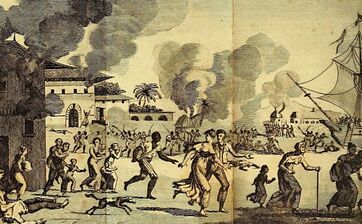Further Reading
Laurent Dubois, Avengers of the New World (Harvard University Press, 2005). Jeremy D. Popkin, A Concise History of the Haitian Revolution, Vol. 3 (John Wiley & Sons, 2011). --, Facing Racial Revolution: Eyewitness Accounts of the Haitian Insurrection. (University of Chicago Press, 2010). Carolyn E. Fick, "The Haitian Revolution in the Atlantic Context," Proceedings of the Meeting of the French Colonial Society, 19 (1994) pp. 128-140. Alyssa Goldstein Sepinwall, "Beyond 'The Black Jacobins': Haitian Revolutionary Historiography Comes of Age," Journal of Haitian Studies, 23:1 (Spring 2017), pp. 4-34. C.L.R. James, The Black Jacobins: Toussaint L'Ouverture and the San Domingo Revolution, (Penguin UK, 1938, reprint 2001). Additional Websites Fictions of the Haitian Revolution Haitian Studies Association BlackPast Related Content Haitian Revolution, Part II: 1794-1804 Music: "Evening Melodrama" by Kevin Macleod (www.incompetech.com)
4 Comments
Alyssa Sepinwall
11/20/2019 12:15:11 am
Glad you found my CLR James article useful, and thanks for bringing the Revolution's story in this form to your listeners!
Reply
Aneesh
2/7/2020 02:42:26 pm
heyoo
Reply
2/9/2023 11:48:54 am
Enjoyed this. I read Isabelle Allende's Isla Bajo Del Mar. Great read, but i enjoyed hearing a more factual account of events. Thank you.
Reply
Leave a Reply. |
Site Map |
© 2013-2024 Footnoting History. All rights reserved.
Footnoting History and the Footnoting History logo
are trademarks of Footnoting History, NY. Footnoting History operates under a SAG-AFTRA Micro-Monetized Podcast Agreement. |


